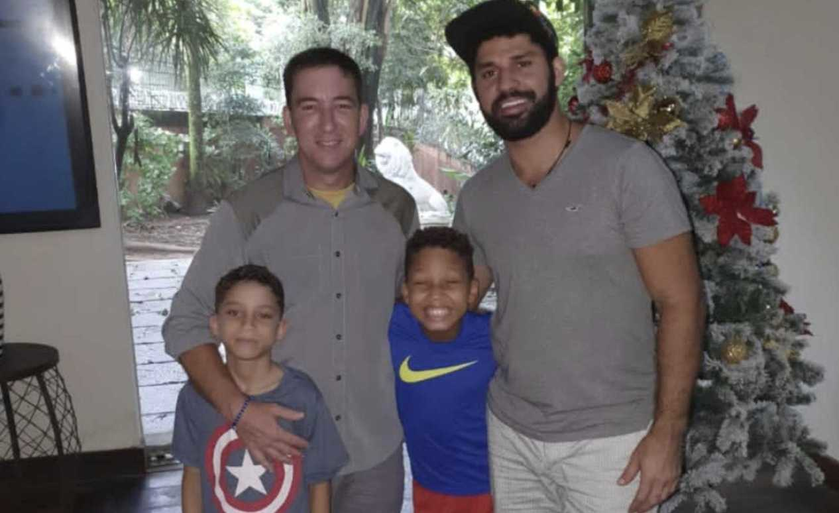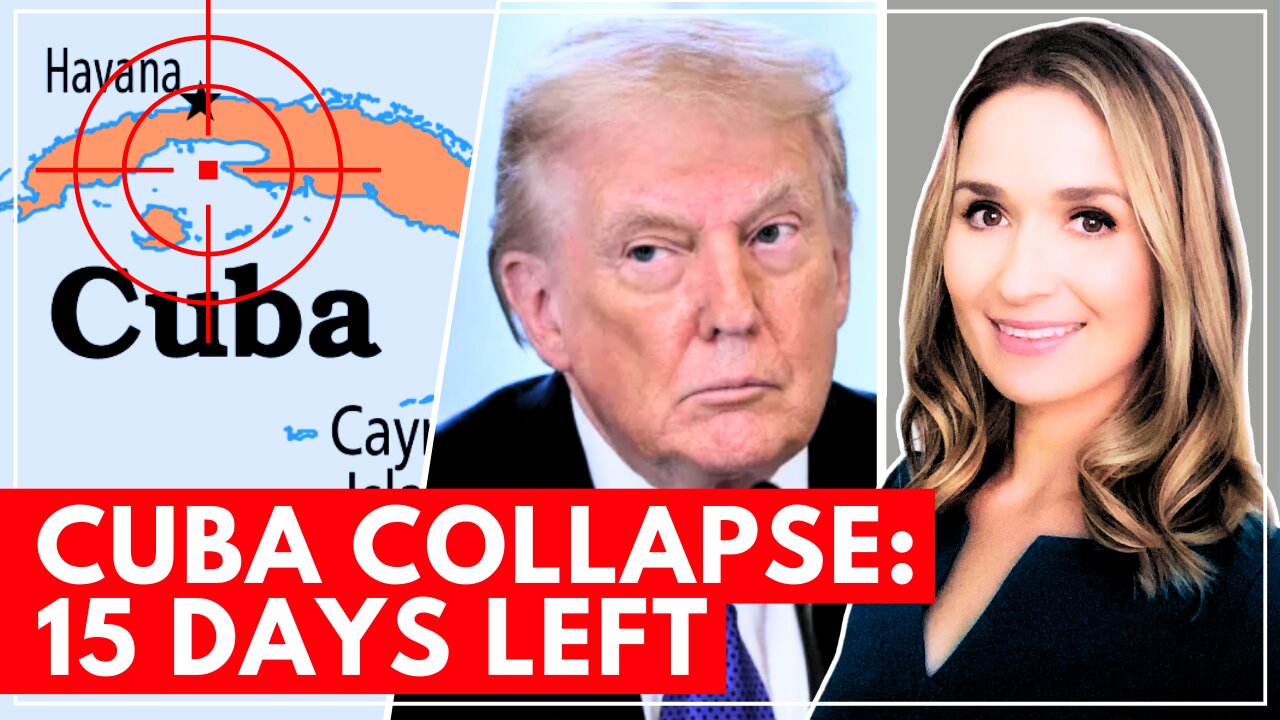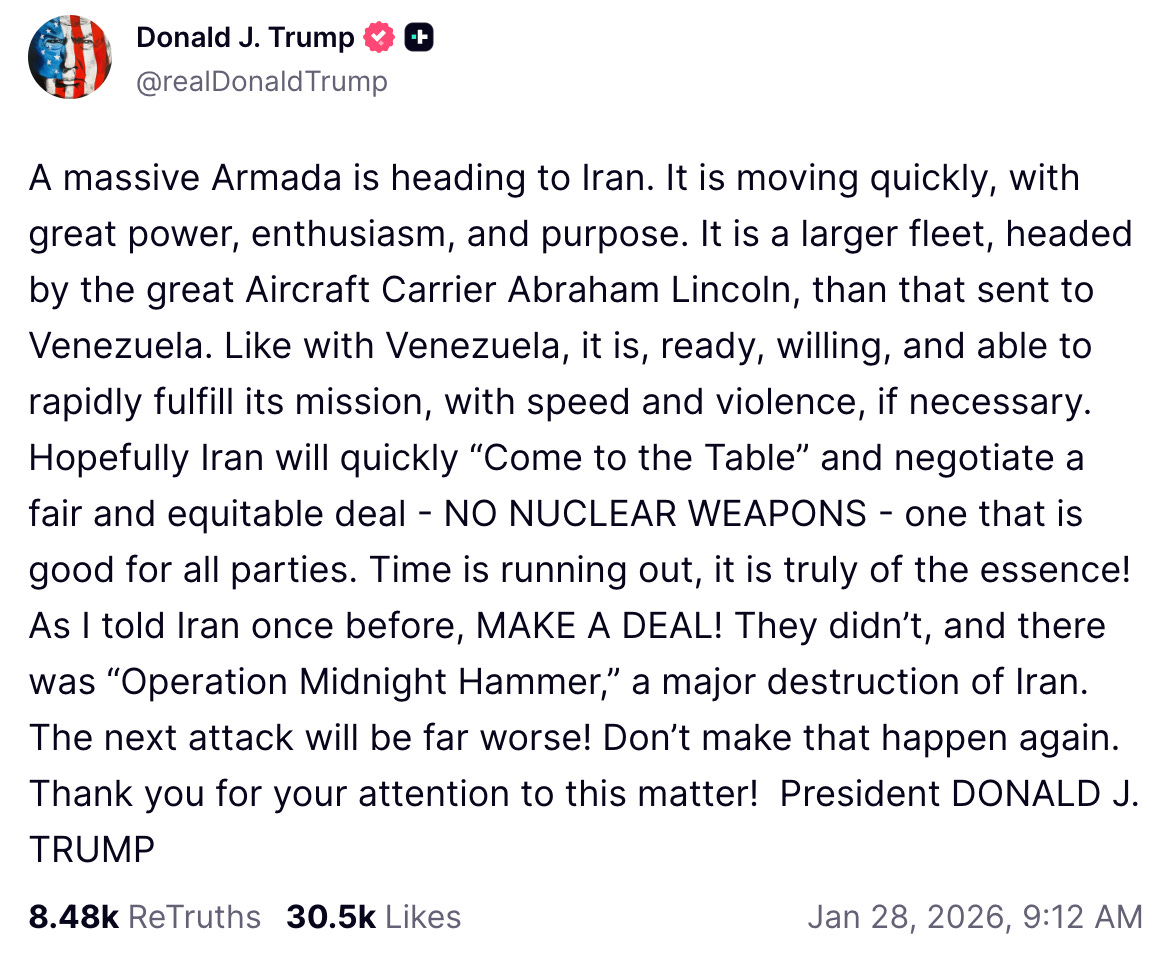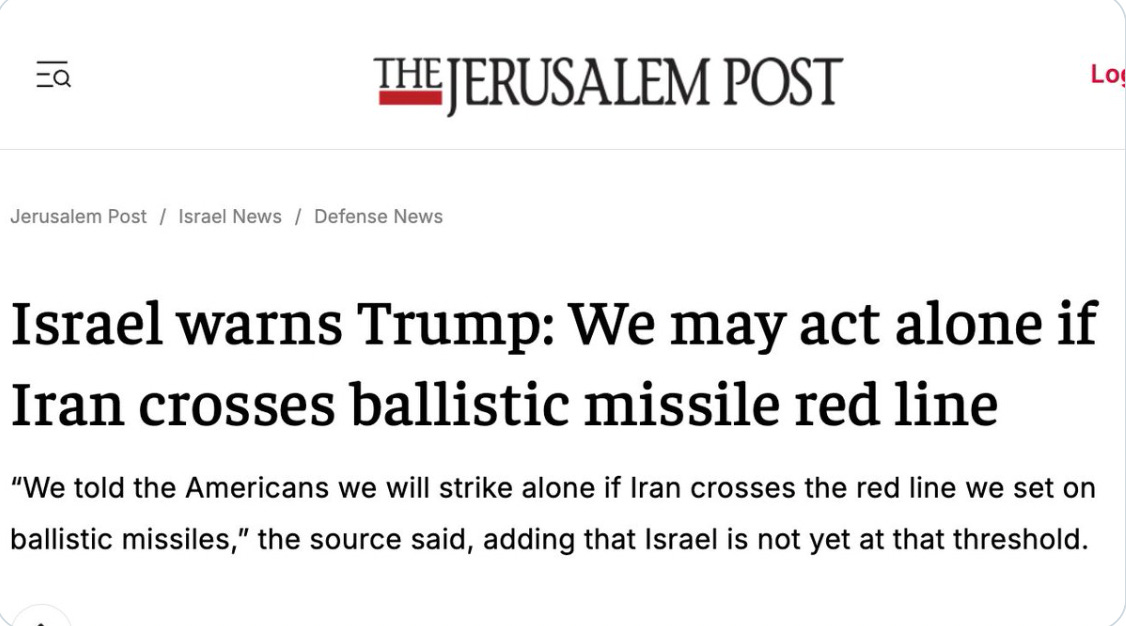Despite the fact that my life has been dominated over the last eight months by my husband's ongoing health crisis, I have tried hard to avoid writing about it. In part it is because I'm well-aware that everyone's lives, at some point, will entail significant suffering and (except to us) there's nothing uniquely important or interesting about ours. In part it is because – especially ever since we began raising children – I have always tried to maintain at least some separation between the public and private parts of my life. In part it is because I strongly dislike the pervasive form of narcissistic "journalism" that entails little more than a desire to talk about oneself and one's feelings, dramas, and "traumas" dressed up as something more profound. And in part it is because I know that reporting and political commentary – and not personal reflections – is what my audience principally seeks, expects and desires.
Ever since David – on August 6, 2022: close to eight months ago – was very suddenly and unexpectedly hospitalized in ICU with a life-threatening illness, I have made exceptions on a couple of occasions by writing about all of this (the last article of any length that I wrote, back in November, contains details about his illness and trajectory and ours, for those interested). I had continued to post concise updates about his health online largely because I believe we owed updates to the Brazilian public about David, a then-Congressman seeking re-election, before we petitioned a court to withdraw his re-election campaign last October on health grounds. And even after we withdrew his candidacy, I have continued to post short updates because David, as an elected official, inspires a lot of love and support and people often ask about his recovery process.
But the primary reason I have also occasionally written or otherwise spoken about our family's situation (as I did with Megyn Kelly when she asked in January) is it is just impossible for me not to do so. None of us is a machine. I believe a major part of my ability to maintain a large and loyal audience for so many years is that they trust that -- even when they don't agree with particular views -- I'm speaking as honestly and authentically as I can. And there's just no way to maintain any form of authenticity if one is steadfastly concealing the singular event shaping every day and affecting essentially everything: from my sometimes-reduced work output to my energy levels to my emotional state.
But I have tried hard to avoid writing about our family's ongoing crisis unless I believe I have something worthwhile to say about it. That was what caused me to write about this the last time back in November, on the three-month anniversary of his hospitalization, when a Brazilian news outlet published a lengthy profile of how our family has navigated this deeply difficult process. I felt I had a couple of thoughts to share then that were worthwhile for others to hear. That was not because I believed these insights were unique epiphanies which I and I alone have had (they are not). It was because some core truths can really be understood – not rationally comprehended but viscerally ingested – only from an intense form of emotional suffering and pain of the kind my family and I have endured since August.
While I have had my fair share of sad experiences of the kind most people encounter – the loss of my grandparents and parents being chief among them – the unexpected and repeated flirtation with death over the last eight months by my 37-year-old, previously healthy, and very physically fit and strong spouse is unlike anything I have ever imagined I would have to face. Nothing is close. This is a different universe of despair, fear and sadness than anything I have previously known. It continues to permeate every physical and emotional pore of my life.
And all of that is, in turn, made more difficult by the fact that I have the responsibility to do everything possible to support our children as they have had to endure the absence and contemplate the loss of a parent at time when kids of their age (now young teenagers) most need parents, all while I have to accept that there are major limits on my ability to protect them because I cannot fix the core cause of their suffering. I have not yet encountered a pain worse than having to watch your own children suffer without having the ability to stop it and I hope never to do so.
At the same time, the responsibility to do everything to support our kids through all of this has been the most potent source of motivation and energy for me. Mine and David's kids, and the responsibility to care for them, has been what has provided the most comfort and strength. The moments when I have been able to lessen their pain or when they provide to me moments of relief and levity, and when I could see our family strengthening and unifying through this and as a result of it, have been some of the most gratifying of my life.
I am choosing to write about this again now only because I have a couple of new thoughts from the events of the last several months that may be interesting or even helpful to others. To start with the bottom-line and relatively good progress report: each month that David has been hospitalized, his condition, on net, has improved as compared to the previous month. In other words, after arriving at the hospital on August 6 in an extremely grave condition from a suddenly inflamed and infected abdominal region that quickly spread via his blood to multiple organs, he has made some progress each month toward recovery.
But that progress is invariably slow, incremental, arduous and almost always spiked with setbacks and complications that are alarming, devastating, exhausting and at times potentially fatal. Even with all of these improvements, he is still in ICU – he has not left since his arrival almost eight months ago – and nobody can or will say that his survival is fully guaranteed. But nothing is guaranteed in life – that is most definitely one of the lessons this has forever drummed into my head – and his prognosis is now good, certainly far better than at any time since this began.
Starting in the first week, there have been three occasions when his doctors called me and told us to prepare for the worst, that his chances for survival over the next 48 to 72 hours were very low, close to impossible. That is independent of the multiple times when the news was grim but did not descend to that level. I won't even bother trying to explain what it's like to have to tell your children and your husband's family and best friends that it is time to go to the hospital for what is likely to be the last time, nor will I try to put into words what it is like to simultaneously have to endure it yourself while doing everything you can to help your kids get through moments like that. But somehow – for reasons even the best doctors in Rio de Janeiro admit they cannot explain – he navigated past each of those. And each time, he has somehow found a way to continue to improve.
The most important part of David's ongoing recovery is that he is now almost always fully awake, communicative, alert, aware, interactive and increasingly strong. Other than the first six weeks -- when he was basically in a medically induced coma – there have been some moments when he was mildly awake and communicative. But it is only in the last eight weeks when this is his normal state. Although his verbal communication is still impeded by his need to depend sometimes on a ventilator for breathing assistance, that is less and less the case. When he is off the ventilator, which is now most days, he is able to speak with the use of a device that captures enough air to allow him to be heard in his normal voice (even when he is off the ventilator, the machine remains connected to him through the tracheostomy in his windpipe, which is why he needs a device to speak).
None of David's problems has ever been neurological or cognitive, and so I always believed he would have no impairments of that kind despite months of heavy sedation and disorientation. And that, very thankfully, has turned out to be the case. There is a mountain of studies on the long-term psychological trauma of prolonged ICU stays (which means a few weeks, not 8 months and counting), and the radical personality changes that often result. I have seen little to no evidence of that in David. His personality, his sense of humor, his recollection, even the way he playfully insults me the way only a spouse of 17 years can are all remarkably constant. While I have no doubt that all of us, but especially he, will have long-term work to do in treating the psychological impact from all of this, I don't feel, when I'm in his ICU room, that I'm speaking to an altered or partial version of David but rather to David himself, as I have always known him.
And that leads to the primary point I want to emphasize. Over the last four or five weeks, I have been able to spend both weekend days with David for up to twelve hours each day. I try to ensure the kids do not stay longer than an hour or two because I try to keep their lives as normalized as possible. I go there when he wakes up and is communicative and only leave to eat, exercise, and then when he falls asleep.
There's obviously not much we can do in his ICU room. Sitting at his bedside and talking, or watching films and series together, are essentially the only two options. So that is what we do: sometimes together with our kids, usually just the two of us. And the amount of joy and happiness and gratification and fulfillment which that provides is absolutely impossible to express. It is unlike the joy anything else has ever provided me in my life.
There were months when I was very doubtful about whether I would ever again have this simple pleasure: just sitting and talking to him. During those first particularly excruciating months, I found myself wanting nothing other than that: just the ability to sit next to him again and talk. And now I have that, at least for now.
I still do not know for sure how much longer I will have it: is it just yet another stage of the cruelty that this process has entailed of making me repeatedly believe he was getting better only to receive one gut punch after the next that made me believe the opposite was happening? Is there some new infection lurking around the corner or some virus returning that cannot be managed without a regime of toxic medication that imposes more burden than his liver and bone marrow can sustain? I do not know for how long what we have now will last.
But that was always true. We just never realized it before. Every day since 2005 that David and I woke up and went to sleep and shared and built our lives and careers together and then began raising our children together, we assumed – due to our age and health and hubris – that we would have that for decades to come, as if it were a guarantee, as if the universe had provided us with some enforceable contract that entitled us to assume this belonged to us and could not be taken away. And because we assumed it, we took it for granted. And because we took it for granted, we often ceased valuing it the way it deserved to be valued.
These days, especially on the weekends, I wake up excited and eager. That is not because I have anything exotic or glamorous or unique planned. It is because, at least for the moment, I get to do something that I – before last August – had been able to do every day for seventeen years but just treated as banal, ordinary, and thus unworthy of celebration: just sitting and talking to the person I was born to share my life with, my soul-mate, my best friend, the one love of my life.
There is nothing anyone could offer me – no amount of money, no career opportunity, no trip, no gift, nothing – that would come close to the intensity and depth of the joy I get from just sitting for hours and talking to David about anything and everything, from recalling past memories, reminding ourselves of future plans (including adopting a girl in 2023 for our kids to have a younger sister), hearing his ample views on my Rumble program that he is only now able to see (mostly positive though with some pointed stylistic, fashion and substantive critiques), to discussing how best to handle our kids' various issues, to bickering over his grievance that I excessively praised certain films and shows I was eager for him to see and thus made him watch. There is nothing anyone could offer me that would even tempt me to consider as an alternative to spending the day with David in his ICU room - something I do not out of burden or obligation or with a sense of dread (as happened many times in the last seven months when things were so much worse and he was barely conscious and often unstable) but out of excitement and joy and connection.
It is extraordinary how often we spend so much of our lives chasing things we have been told to value and desire all while, right under our nose, the things that actually make us happiest and most fulfilled are just sitting there, often devalued because they seem too simple or too familiar or already acquired. It should not take the fear of losing something for us to take the time to realize how much we value it.
One day, a year or so after we adopted our kids, I had spent about an hour just randomly sitting on the floor of the oldest one's room chatting and laughing aimlessly with both of them, interspersed with a few mildly serious discussions of the future. None of what was said was particularly memorable, though that is the point. As I was leaving the room to return to work, I felt a joy and fulfillment and deep purpose I had not really felt before – not despite the simplicity of what had just happened but because of it. Humans are social animals and those of us lucky enough to develop and enjoy deep and genuine human connections possess that which is most valuable in the world, even if we fail to realize the value of it.
One of the inherent, centrally defining and universal attributes of being human is that nothing in our lives is permanent. We know rationally that we will eventually lose everything – including the things and people we most love and value, culminating in our own lives on the planet – but we never know how or when it will happen. Yet that knowledge somehow fails to prevent us from falsely assuming that the things we have that we most value – starting with life itself, our health, our family and friends – will be with us forever, and there is thus no reason to go out of our way on any given day to embrace them or honor them or feel gratitude for them or to be present to how beautiful they are.
There is an emerging body of neurological studies proving that the affirmative act of seeking gratitude – as opposed to just passively experiencing gratitude – produces positive and healthy chemical reactions in our brains. When good things happen to you – you get a new job you want or earn a raise; someone you like expresses reciprocity; you receive praise or recognition for what you have done – gratitude comes easily and passively. It is automatic: one does not need to search for it.
But even in the most difficult moments, we still have things which merit gratitude. And remembering that and then going on a hunt for them, though often hard, is immeasurably helpful.
For the first two months of David's illness, the worst part of each day was waking up. In those two to three second after awakening -- before my defenses were up, before I could even orient myself to the state of being awake -- the renewed agony washed over me as I realized what was happening. That was often immediately compounded by looking at the empty space in the bed which he had always occupied. There were many days back in August, September and October where I never recovered from the sadness and fear of the first several seconds of my day. It shaped everything that followed for the remainder of each day, including my physical and mental state.
That only changed when -- following some wise advice -- I deliberately began seeking gratitude as my first act after awakening. Instead of wallowing in despair and fixating on what was bad (David's absence and life-threatening illness), I chose instead to focus on what was good: David is alive; our kids are healthy, and they are amazing, well-adjusted, happy, loving kids; I have my health and the ability to do everything that could be done for David and our kids. When I say seeking gratitude was a choice, that's what I mean. It was something I pushed myself to do as soon as I felt that dread and misery returning. It was never easy. Defaulting to a focus on the bad parts of life is always effortless; it is where inertia and inaction will take you. Rejecting that requires force, determination and struggle. Though it is a bit cliché, it is nonetheless true that we cannot control many events in our lives but we can always choose how we interpret and view them.
When I started to do that, it changed everything. Wallowing in despair helps nobody. It weakens and depletes, prevents you from doing what you can to take all the actions possible to support those whom you most want to support. Seeking, finding and embracing gratitude for the things in my life that merit it even gave me more physical strength: I was able to work out more and more, to do more and more exercise, to pay far more attention to my diet. And all of those phsyical activities and the strength that it produced, in turn, strengthened my emotional state, for reasons now demonstrated by multiple neurological studies. None of that meant there were no more hard days. There were many, some close to unbearable. There still are. But there are no days any longer when I wonder whether I can or should be doing more for those I love most – especially David and our kids. You can't transmit positive energy and optimism and encouragement and faith and strength to someone unless you actually have and feel it yourself.
What remains most astounding to me is that – after all these years, these decades, of running and chasing and striving and reaching and grabbing and struggling and pursuing – everything that I actually need for core happiness, fulfillment and gratitude are things I already have and have had for a long time. That starts with my ability to just share moments of lucid, connected, genuine and loving conversations, whether simple or complex, with my life partner and now with our kids.
And while I don't know how many days or weeks or months I will have this - I don't even know if I'll have it tomorrow when I wake up or whether the doctor's daily morning call will contain news of some unexpected negative development – that's true of everything. That was true long before David was hospitalized. Nothing is guaranteed. The only difference is that while I am now painfully aware of this, I spent most of my life being unaware of it, of taking it for granted.
And the lack of permanence of those things that provide us the greatest happiness does not make them less valuable. That is what makes them valuable. Their impermanence is the reason to grab them, hold them, appreciate them, and honor them every day that we have them and are thus able to do that.



















